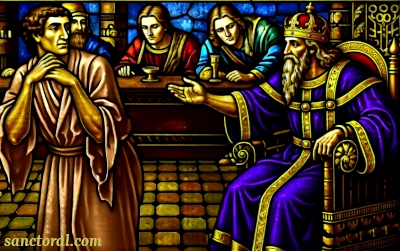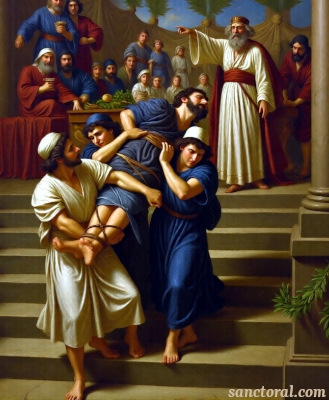About this time (Fifth Sunday in September) the story of Esther is read in the divine Office. In order, therefore, that with the Church, we may every year review these Old Testament types, and also continue our study of the Sundays after Pentecost in the light of the breviary, we may usefully make Esther the subject of our exposition today. Upon learning of this decree, Mardochai indulged in great lamentations, the Jewish community, as a whole, being, naturally, plunged into extreme mourning, while Mardochai took the further step of telling Esther that, if the opportunity presented itself, she ought, even at the peril of her life, to inform the king of Aman’s plot. “Who knoweth whether thou art not come to the kingdom that thou mightest be ready for such a time as this ?” Whereupon Esther, after fasting three days with her servants, presented herself the third day, royally dressed before the king with the request that he would join her in a feast, together with Aman. This the king promised to do. In the course of the banquet the queen began her complaint to the king: “We are given up, I and my people, to be destroyed, to be slain and to perish.” And Assuerus learning that Esther was a Jewess and that Mardochai was her uncle, “answered and said: ‘Who is this, and of what power that he should do these things.’ And Esther said: ‘It is this Aman that is our adversary and most wicked enemy.’ Upon this, the king enraged against his minister rose up and commanded that Aman should be hanged on the giber that he had prepared for Mardochai, this sentence being carried out immediately, while the edict against the Jews was revoked. This bible narrative shows how God watched over His people and preserved them, for the sake of the promised Messias. “I am the salvation of the people,” saith the Lord, “in whatever tribulation they shall cry to me, I will hear them; and I will be their Lord forever” (Introit). “If I walk in the midst of tribulation, Thou wilt quicken me, O Lord; and Thou wilt stretch forth Thy hand against the wrath of my enemies; and Thy right hand shall save me” (Offertory). The Communion psalm speaks of the just man weighed down by misfortune whom God forsakes not, while that of the Gradual shows, how in answer to the cry of those who hope in Him God causes the sinner to fall into his own net and again, that of the Alleluia sings of all the marvels which God has wrought for the deliverance of His people. All this is a type of what God is constantly doing for His Church and of what He will do in a special way at the end of time. Aman, whom the king condemned at Esther’s banquet, is like the man spoken of in the Gospel who came to the wedding feast and was cast by the king’s command into exterior darkness because he had not on a wedding garment, that is because he had not “put on the new man who according to God is created in justice and holiness and truth”. (Epistle). Thus will almighty God treat all those who, while belonging to the body of the Church by their faith, are found within the wedding-chamber without being clothed, as St Augustine puts it, with the robe of charity. Since they are not quickened by sanctifying grace they have no share in the soul of the mystical body of Christ. “Wherefore,” says St Paul, “putting away lying speak the truth every one with his neighbour, for we are members one of another... Let not the sun go down upon your anger” (Epistle). Those who do not fulfil this command will be cast by the supreme judge into the torments of hell. Assuerus, in his anger, caused Aman to be hanged. So also the king in the Gospel “was angry; and sending he destroyed those murderers and burnt their city.” More than a million Jews perished at the time of the siege of Jerusalem by Titus, the Roman general when the city was destroyed, and the Temple burned. The faithless Aman was replaced by Mardochai; the wedding guests by those whom the king’s servants found in the highways; the Jews by the Gentiles. To these last, at Pentecost, the apostles turned, filled with the Holy Ghost. And at the last Judgment, foretold on these last Sundays of the cycle, these rewards and punishments will be final. The elect will take part in the eternal marriage feast, while the damned will be cast into exterior darkness, into the avenging flames, where there will be weeping and gnashing of teeth. (Saint Andrew Daily Missal with Vespers for Sundays and Feasts, by Dom Gaspar Lefebvre, O.S.B. of the Abbey of St. André, 1953) I am the salvation of the people, saith the Lord: in whatever tribulation they shall cry to Me, I will hear them; and I will be their Lord for ever. Ps. (77, 1) Attend, O My people, to My law; incline your ears to the words of My mouth. Gloria Patri. Almighty and merciful God, in Thy goodness keep us, we beseech Thee, from all things hurtful; that we, being ready both in body and soul, may accomplish those things which belong to Thy service. Through our Lord... St. Paul tells us that we must strip ourselves of the old man as an old garment is taken off, and put on Christ as a new garment is put on. In biblical times “to put on a garment" meant entering into the state or function of which the garment was only an outward symbol; “put on Christ,” therefore, means putting away passions, and all the evil desires that we have inherited as children of Adam, and living henceforth the life of Christ and in conformity with the law of charity which He has given us. Lesson of the Epistle of Saint Paul the Apostle to the Ephesians (4:23-28) (Ps. 140:2) Let my prayer be directed as incense in Thy sight, O Lord. ℣. The lifting up of my hands as evening sacrifice. Blessed is the nation whose God is the Lord: the people whom He hath chosen for His inheritance. ℣. By the word of the Lord the heavens were established; and all the power of them by the spirit of his mouth. Alleluia, Alleluia. ℣. Give glory to the Lord, and call upon His name: declare His deeds among the nations. Alleluia. “God the Father,” says St. Gregory, “made a marriage feast for God the Son when He gave Him a human nature in the womb of the Virgin; and especially when, through the Incarnation, He united Him to His Holy Church. Twice He sent His servants to call His friends to the feast; for the Incarnation of the Son of God was foretold by the prophets as a coming event, and announced by the apostles as an accomplished fact. The bad and good guests are those which the Church of today receives indiscriminately: but at the last hour, she will make the final separation. When anyone is invited to a marriage feast in this world he changes his clothes to show that he shares the joy of the bride and bridegroom; we, who are present at the marriage feast of the Word, who hold the faith within the Church, who are fed by the Holy Scriptures, and who rejoice in the union of the Church with God must clothe our hearts with the scarlet robe of charity, which is the garment required by God” (Homily at Matins). Sequel of the holy Gospel according to Matthew (22:1-14) (Saint Andrew Daily Missal with Vespers for Sundays and Feasts, by Dom Gaspar Lefebvre, O.S.B. of the Abbey of St. André, 1953)Nineteenth Sunday after Pentecost - The wedding garment

Table of Contents
Reflexions on the Liturgy of the Day
Assuerus, king of Susa in Persia (482-472, B.C.), had chosen Esther, niece of Mardochai as his queen. Aman, the majordomo of the palace, well known for his hatred of the Jews, noticing that Mardochai refused to bow the knee before him, flew into a great rage, and knowing Mardochai to be a Jew, swore to exterminate at one blow all the members of his race. To this end, he laid a complaint before the king against these foreigners who were settled in all the towns of his kingdom, and obtained a decree authorizing their wholesale massacre.Liturgy of the Mass
Introit
Collect
Epistle
Brethren: Be ye renewed in the spirit of your mind, and put on the new man, who according to God is created in justice and holiness of truth. Wherefore, putting away lying, speak ye the truth every man with his neighbour, for we are members one of another. Be angry, and sin not. Let not the sun go down upon your anger. Give not place to the devil. He that stolen let him now steal no more: but rather let him labour, working with his hands the thing which is good, that he may have something to give to him that suffereth need.Gradual

Gospel
At that time, Jesus spoke to the chief priests and the Pharisees in parables, saying: The kingdom of heaven is likened to a king, who made a marriage for his son; and he sent his servants, to call them that were invited to the marriage, and they would not come. Again he sent other servants, saying: Tell them that were invited: Behold, I have prepared my dinner; my beeves and failings are killed, and all things are ready; come ye to the marriage. But they neglected: and went their ways, one to his farm, and another to his merchandise; and the rest laid hands on his servants, and having treated them contumeliously, put them to death. But when the king had heard of it, he was angry; and sending his armies, he destroyed those murderers, and burnt their city. Then he saith to his servants: The marriage indeed is ready,but they that were invited were not worthy. Go ye therefore into the highways, and as many as you shall find, call to the marriage. And his servants going forth into thé ways, gathered together all that they found, both bad and good; and the marriage was filled with guests. And the king went in to see the guests; and he saw there a man who had not a wedding garment: and he saith to him: Friend, how earnest thou in hither, not having on a wedding garment? but he was silent. Then the king said to the waiters: Bind his hands and feet, and cast him into the exterior darkness: there shall be weeping and gnashing of teeth. For many are called, but few are chosen. Credo